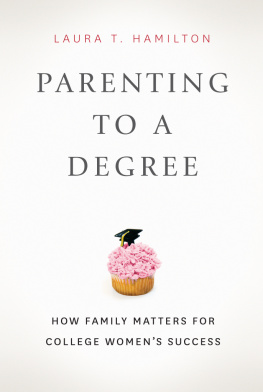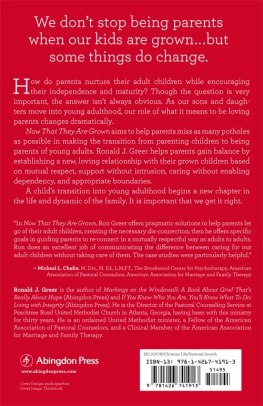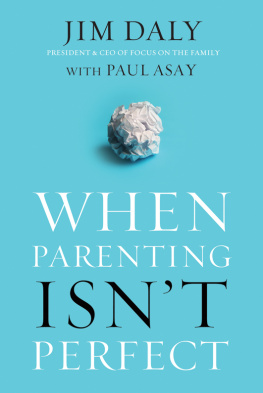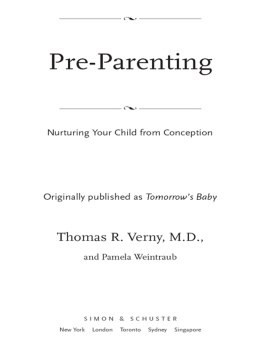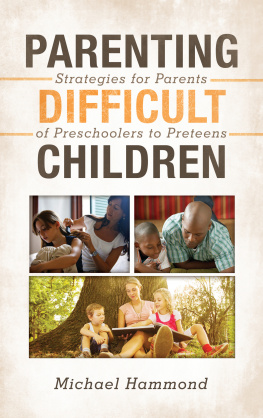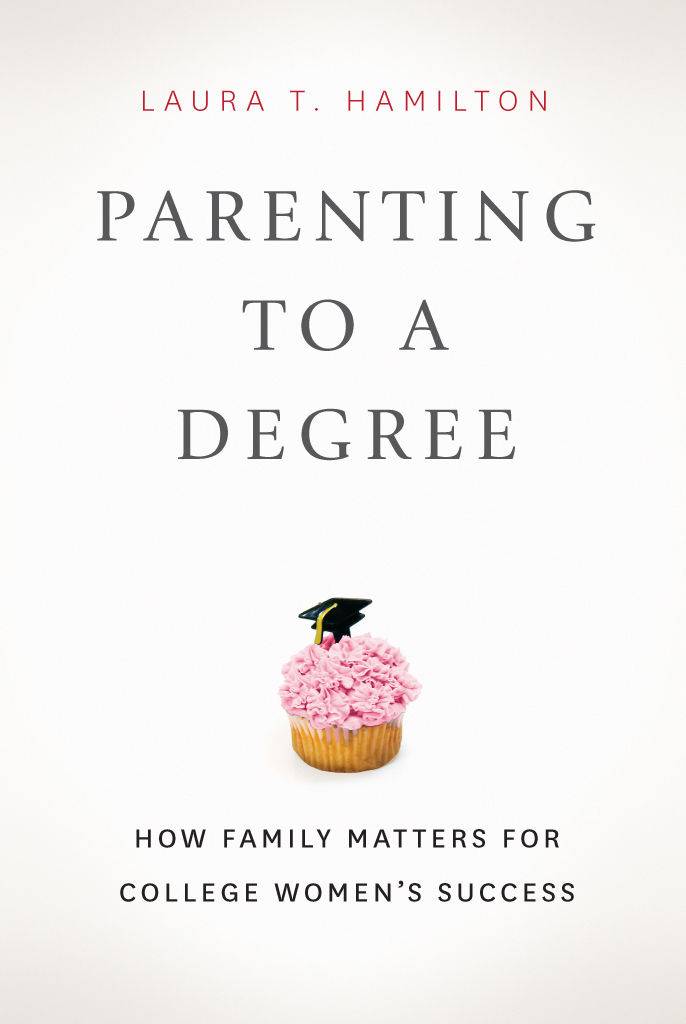Parenting to a Degree
How Family Matters for College Womens Success
Laura T. Hamilton
The University of Chicago Press
Chicago and London
Laura T. Hamilton is associate professor of sociology at the University of California, Merced. She is coauthor of Paying for the Party: How College Maintains Inequality.
The University of Chicago Press, Chicago 60637
The University of Chicago Press, Ltd., London
2016 by The University of Chicago
All rights reserved. Published 2016.
Printed in the United States of America
25 24 23 22 21 20 19 18 17 16 1 2 3 4 5
ISBN-13: 978-0-226-18336-7 (cloth)
ISBN-13: 978-0-226-18367-1 (e-book)
DOI: 10.7208/chicago/9780226183671.001.0001
Library of Congress Cataloging-in-Publication Data
Names: Hamilton, Laura T. (Laura Teresa), author.
Title: Parenting to a degree: how family matters for college womens success / Laura T. Hamilton.
Description: Chicago; London : University of Chicago Press, 2016. | 2016 | Includes bibliographical references and index.
Identifiers: LCCN 2015039580 | ISBN 9780226183367 (cloth: alkaline paper) | ISBN 9780226183671 (e-book)
Subjects: LCSH: College student parentsResearch. | Women college StudentsResearch. | Academic achievement. | Parenting.
Classification: LCC LC1568 .H36 2016 | DDC 378.1/98dc23 LC record available at http://lccn.loc.gov/2015039580
This paper meets the requirements of ANSI/NISO Z39.48-1992 (Permanence of Paper).
To the families who made this book possible
Contents
A line of standstill traffic stretched a mile past a cluster of dormitories. Observing the vehicular chaos, I thanked my friend for the ride and went in on foot. Police were telling frustrated parents who parked illegally to move their vehicles. Dumpsters were overflowing with boxes no one had bothered to break down. I nearly collided with a father carting cases of weight-loss shakes for a slender woman, who was overdressed for moving in a ruffle skirt and tall heels.
Inside, I was acutely aware of my status as a researcher. In reality, I was nearly invisible. Mothers buzzed around me in navigator modelocating food, classes, laundry, and mail. They drew maps and traced out paths on brochures. A mother was on her cell phone asking about the shuttle schedule so her daughter would know exactly when and where to catch it. A few worried about how difficult it was to lock the doors, as this posed a possible safety issue. One was fighting with her daughter over who would turn the key and kept trying to grab the doorknob with an exasperated let-me-do-it gesture.
Several mothers quizzed their daughters about social connections: That was your neighbor, wasnt it? Daughter, with sarcasm: That would be why I said hi. They were also doing their own networking: mothers jointly fussed over the arrangement of the rooms, sizing each other up in the process. Decorating was a high-stakes activity. Groups of mothers and daughters made rounds to seeand judgeothers interior designs. As one observer scoffed, Some people did too much. An air purifier? Come on.
Fathers were bearers of goods. A cluster of three could be spotted sitting on the wraparound couch near the dolly return, exhausted after a day of manual labor. Another remarked, with relief: We got a lot of stuff in that room. I didnt think it would all fit! Some were dispatched as emissaries for needed goods. Ethernet cords and a difficult-to-locate bed-bunking tool were in high demand. One father, who was told to canvass multiple stores, apologized profusely to his daughter for not procuring a pink rope light.
These loud and loaded-down parents took up a lot of space. They were hard to ignore. But they were not the only parents of college students on the floor I was studying. Some did a perfunctory delivery, stopping only long enough to get their daughters settled. They skipped parent orientations and receptions because they really didnt like that sort of thing or to honor their daughters burgeoning independence. Others never made the drop-off. They could not afford time off work or did not realize that help was needed. Their daughters were in no danger of overflowing their rooms. These women quietly schlepped their minimal possessions up the stairs and shut their doors, muting the lively commotion just outside.
Move-in day is a defining moment for many families, marking the achievement of a parenting milestone. As Mitchell Stevens explains in Creating a Class: College Admissions and the Education of Elites, college shapes the decisions that parents make about what jobs to accept, neighborhoods to live in, K12 schools their children should attend, and extracurricular activities to encourage. They push for their favorite schools, and children make a case for their own. Numbers are crunched. Decisions are made, and disappointments are weathered. Families stock up, pack up, and make the drive. Emotional drop-offs may ensue, and houses become empty nests. And then the swarms of parents abate.
The media refers to these parents as helicopters, and they are among the most reviled figures of twenty-first-century parenting.
But is it true? Do involved college parents damage their children and burden universities? What does active parenting look like outside of the Ivies, for students in less-pressured residential college contexts? In Parenting to a Degree: How Family Matters for College Womens Success, I argue that many parents of college students face a terrible paradox. Especially at mid-tier public institutions like Midwest U, educational and professional success almost requires moderate to extensive financial, emotional, and logistical parental support through college and the transition to the labor force. If parents can manage it, the right kind of help provides students with a distinct advantageone that is hard to deny. Contrary to popular opinion, universities also recognize the value of invested parents: many institutions seek to recruit, rather than evade, parents to whom they can outsource a wide array of tasks and responsibilities. By ensuring student success, these parents also contribute to institutional standing.
Yet this arrangement often comes at a cost. Heavy parental involvement during college drains parents monetary and psychological reserves. It tends to create greater dependence among youth than parents originally imagined. Thirty or even forty years of intensive parenting may be necessary to ensure childrens success. Often it is hard to know what the best investments are and how much money and effort to devote to them. Concerns over how to parent are warranted, as not all forms of involvement are equally effective. Parental efforts to support college students can even backfire, taking some parents by surprise.
Perhaps the greatest price, however, is the potential for increased inequality. Students with involved parents often outperform and outmaneuver those whose parents take a less active role. Typically, involved parents are affluent, highly educated, and have the ability to meet high financial and interactional demands. The intent to help is not enough. Often the efforts of parents with more limited means fail when not backed by class-based resources. Parenting to a Degree explores the consequences of building the expectation of parental labor and funds into a college degree, when not all parents can offer the same degree of assistance.
Invasion of the Helicopters
Individualistic attacks on helicopter parents as bad, harmful, or just plain annoying miss an important point. They did not emerge out of thin air. Nor are helicopters a product of some new age psychosis. Instead, these parents are responding to real structural, economic, and social conditions that have been building for decades.

